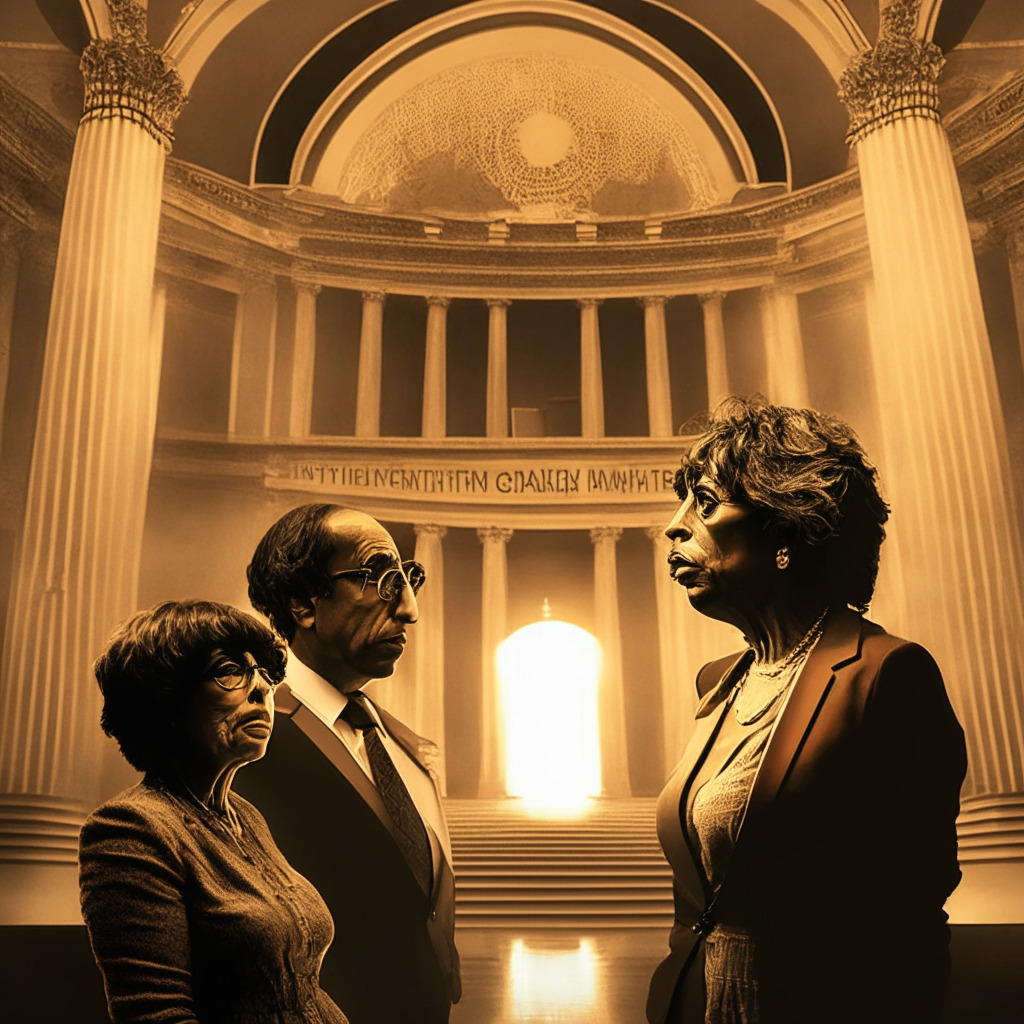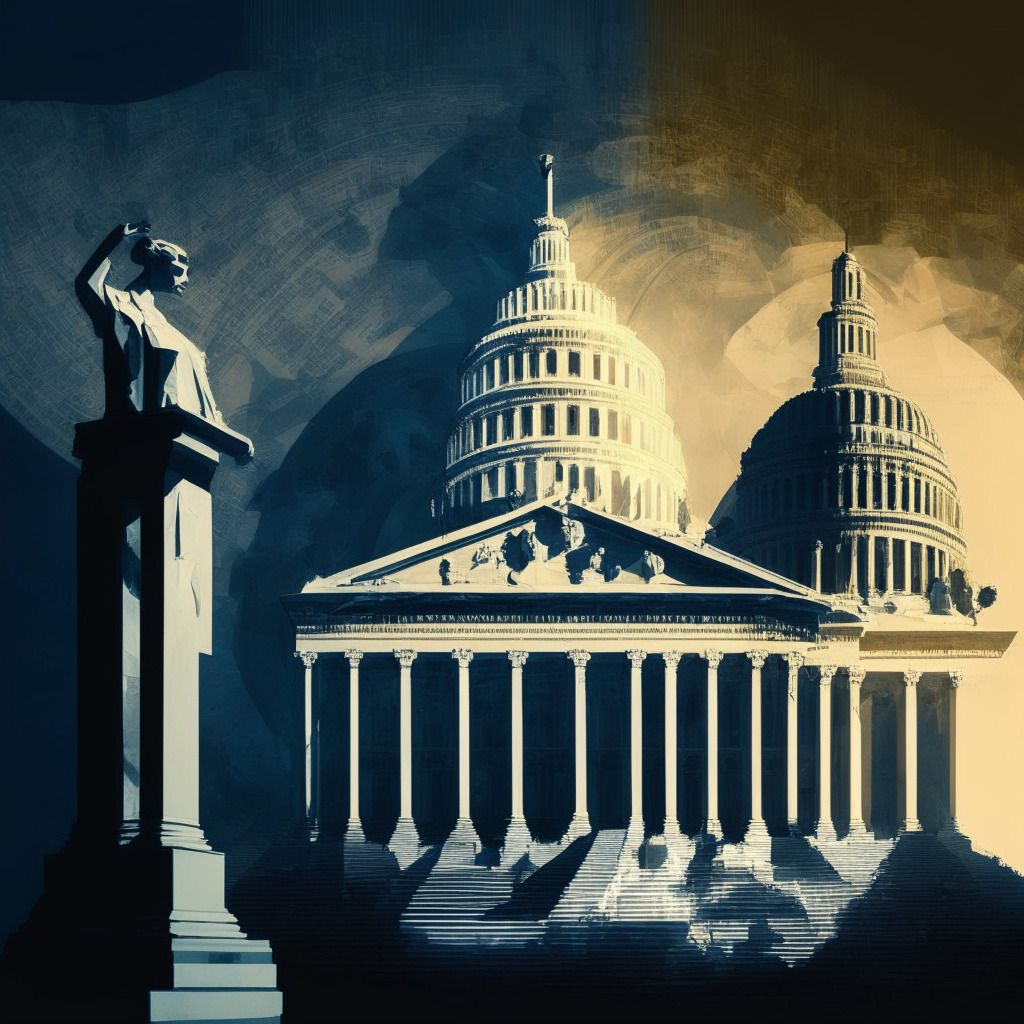Rep. Maxine Waters seeks input from the US Treasury Department and the SEC on the potential impact of the latest crypto bill proposed by Republicans. She questions the bill’s effectiveness in protecting investors, changing the roles of the SEC and Treasury in the crypto market, and its possible threat to financial market stability. The outcome could significantly shape the future of crypto businesses and industry-wide regulations.
Search Results for: Patrick McHenry
Digital Asset Market Structure: A Path for Crypto Regulation or Hindrance to SEC’s Authority?
House Financial Services Committee Chair Maxine Waters proposed the Digital Asset Market Structure bill, offering US-based digital asset exchanges a pathway for SEC registration, seeking regulatory clarity for the crypto industry. The legislation aims to approve digital securities, commodities, and stablecoins for trading while providing guidelines to distinguish between crypto-based securities and commodities.
US Lawmakers Target Banking Failures: Impact on Crypto and Blockchain Industries
In response to major banks’ failures, US lawmakers from the House Financial Services Committee have introduced a series of bills, although not specifically mentioning crypto or blockchain. The future of regulations surrounding banks and their potential impact on the cryptocurrency and blockchain industries remain uncertain, with past lawmakers expressing optimism on stablecoin bills.
US Political Divide on Crypto Regulations: How it Affects Investors and Companies
Without bipartisan support for digital asset-focused legislation, investors and companies may turn to crypto-friendly jurisdictions, warns Moody’s. Key differences include stablecoin regulation and consumer protection, with many crypto firms already exploring options outside the US.
US 2024 Elections: The Crypto Focal Point, Bipartisan Approaches & Prospects
The United States is moving toward a cohesive policy framework for digital assets, with lawmakers evaluating bills related to stablecoins, securities rules, and sanctions. Both parties in the 2024 presidential race are expected to address crypto, but the GOP must focus on embracing blockchain’s potential for America’s long-term economic interests, dispelling misconceptions, and supporting crypto-friendly regulations.
Urgent Need for Crypto Regulations: Debating the Pros, Cons, and Conflicts
A Congressional hearing discussed the Digital Asset Market Structure Discussion Draft, aiming to establish a regulatory framework for digital assets. The industry seeks regulatory clarity amid concerns that insufficient action could have “devastating consequences” for the U.S.’s global digital economy competitiveness.
Navigating the Turbulent Waters of Crypto Regulation: Challenges and Prospects
Congress’ latest proposed crypto bill seeks to resolve the “haphazard, schizophrenic” ways of regulators addressing significant industry players. The bill faces challenges in securing passage and has received mixed reactions from policymakers. However, the bipartisan nature of the issue provides hope for progress in clarifying regulatory expectations.
Upcoming Digital Asset Bill: Balancing Regulation, Innovation, and Investor Protection
The US Financial Services Committee will vote on a digital asset bill to establish a regulatory framework for the crypto industry, providing clear rules and guidelines. The intended outcome is to offer clarity and take the first step towards regulating crypto in the US, addressing issues related to the SEC’s regulation-by-enforcement approach.
Landmark Bill on Crypto Tokens Exemption: Boon or Bane for Securities Laws and Investors?
The McHenry-Thompson draft bill aims to exempt cryptocurrency tokens from securities laws by creating a new asset class labeled “digital assets.” While it gains attention and support, the bill raises concerns regarding regulatory arbitrage and presents challenges reconciling the crypto industry’s goals with existing legislation, causing uncertainties for companies and investors.
SEC vs Coinbase and the Battle for Crypto Regulation in the US: Moral Authority Overreach?
The SEC, led by Gary Gensler, recently filed charges against Coinbase, citing existing U.S. laws to regulate cryptocurrencies. However, ongoing bills in Congress, such as the Digital Asset Market Structure and Investor Protection Act, could undermine these actions and demonstrate Gensler’s potential overreach.
Stablecoin Bill: Federal vs State Regulation and Impact on Digital Asset Ecosystem
The third draft of the new stablecoin bill, “The Future of Digital Assets: Providing Clarity for the Digital Asset Ecosystem,” proposes the Federal Reserve as the key regulator for stablecoins. The bipartisan bill aims to offer comprehensive guidance on supervising and enforcing stablecoin markets, covering aspects like issuer requirements and payment stablecoins.
Bipartisan Stablecoin Bill: Impact on US Crypto Landscape, Regulation, and Innovation Pros & Cons
The US House Financial Services Committee released a draft stablecoin bill, aiming to bring clarity on the digital asset market structure and regulation of payment stablecoins. The bill includes detailing primary federal regulators, regulations on issuing payment stablecoins, supervision, enforcement, and interoperability. The proposed legislation gives federal agencies more authority and oversight of stablecoins, as a first step toward regulating cryptocurrency in the US.
Bipartisan Stablecoin Regulations: Growth Catalyst or Innovation Stifler?
The House Financial Services Committee’s new draft legislative proposal for stablecoin regulations in the U.S. aims to establish bipartisan consensus. This legislation could bring clarity to the crypto market, however, concerns about increased oversight hindering innovation arise. Democrats’ stance on the current version remains unclear.
Cryptocurrency Clarity: June 13 Hearing, Regulation, and Market Impact
The upcoming U.S. House Financial Services Committee hearing on June 13 could bring clarity to the cryptocurrency market, addressing regulatory compliance, investor protection, and market stability. Proposed legislation may regulate crypto assets and exchanges, stabilizing markets and fostering industry advancements. Investors are eyeing various cryptos amidst these developments.
Janet Yellen’s Support for Crypto Regulation: Balancing Investor Protection and Industry Growth
US Treasury Secretary Janet Yellen supports SEC and CFTC enforcing cryptocurrency regulations for consumer protection. However, critics argue over-regulation may stifle innovation. With Congress yet to pass crypto legislation, the industry faces ongoing uncertainty surrounding the appropriate level of regulation.
Upcoming US Financial Services Committee Hearing on Digital Assets: What to Expect
The United States Financial Services Committee has scheduled a hearing on June 13 titled “The Future of Digital Assets: Providing Clarity for the Digital Asset Ecosystem.” It aims to discuss critical issues concerning digital assets and provide clarity for the crypto community.
Upcoming Hearing on Digital Assets: Balancing Clarity, Regulation, and Innovation
The House Financial Services Committee has announced a hearing on June 13th, titled “The Future of Digital Assets: Providing Clarity for the Digital Asset Ecosystem.” Amid an SEC crackdown, Republican lawmakers propose a draft bill for clearer crypto guidelines, seeking a balance between investor protection and innovation in the rapidly evolving digital asset ecosystem.
Crypto Titans and Regulators to Debate New Bill in Congress: Impact on US Innovation
Coinbase, Robinhood, and US commodities regulator representatives will testify before Congress on June 6 regarding a proposed crypto bill. The bill aims to classify certain crypto tokens as digital commodities and provide a clearer regulatory framework. Coinbase Chief Legal Officer Paul Grewal emphasized its importance for protecting consumers and fostering crypto innovation in the US.
Proposed Crypto Bill: Balancing SEC Power and Fair Regulation in Digital Asset Industry
A drafted crypto bill proposed by Republican lawmakers aims to establish a clear framework for digital assets and hold regulatory bodies like the SEC and CFTC accountable for their actions, potentially changing the way digital assets are regulated. The bill could encourage fair enforcement practices, ensure consumer safety, and support innovation within the cryptocurrency markets.
Draft Bill May Reshape Crypto Regulation: Pros, Cons, and Main Conflict
Senior House Republicans introduced a draft bill aiming to establish a concise framework for digital assets in the U.S., allowing regulated crypto firms to argue for commodity classification. The legislation would also introduce digital commodity exchanges with oversight by the Commodity Futures Trading Commission. However, it currently lacks support from Democrats and faces challenges in achieving consensus.
Debt Ceiling Negotiations and Cryptocurrency: Seeking the Perfect Balance
The House of Representatives votes on postponing the debt ceiling until 2025 through the Fiscal Responsibility Act of 2023. This bipartisan agreement will impose limits on discretionary spending, but its impact on growth, innovation and the cryptocurrency sector requires a delicate balance between fiscal responsibility and flexibility.
Debt Ceiling Crisis Looms: Potential Impacts on Crypto and Financial Markets
As the US faces a potential debt crisis, ongoing high-stakes discussions about raising the $31.4 trillion debt ceiling could impact financial markets, including the cryptocurrency sphere. Swift resolution of lingering issues is critical to avoid a widespread crisis and market uncertainty.
Debt Ceiling Crisis Looms: US Economy on the Edge as Biden and McCarthy Struggle to Agree
As the June 1 deadline approaches, the impasse between President Biden and House Speaker McCarthy on raising the US government’s debt ceiling could lead to an unprecedented debt default, impacting the US economy and global markets. With the Treasury’s cash reserves dwindling, both parties need to find a resolution to avoid disastrous consequences.
Freedom to Transact as Vital as Expression: Politicians Weigh In on Bitcoin’s Role and Risks
Democratic presidential candidate Robert F. Kennedy Jr. speaks at the Bitcoin 2023 conference, equating the freedom to transact with freedom of expression. Emphasizing Bitcoin’s importance, Kennedy highlights its role as a bulwark against governmental and corporate intrusion, while advocating for citizens’ rights to hold and use Bitcoin and opposing invasive cryptocurrency regulations.
Bipartisan Efforts to Regulate Stablecoins: Finding Common Ground in Crypto Legislation
Two distinct stablecoin bills from US House Financial Services Committee reflect differing perspectives among Democrats and Republicans. Despite differences, lawmakers aim to reach a bipartisan agreement for effective regulation of the burgeoning stablecoin market while protecting consumers and investors.
Stablecoin Regulation Debate: Balancing Innovation, Dollar Dominance, and Securities Frameworks
The House Financial Services Committee’s Subcommittee is working towards regulating payment stablecoins, emphasizing the importance of dollar dominance and financial inclusion. While the SEC suggests regulating stablecoins through a securities framework, there is strong bipartisan consensus to treat them as cash instruments, with draft bills proposing prudential frameworks including capital requirements, redemption timeframes, and AML/KYC compliance.
Bipartisan Rift Emerges on Stablecoin Bill: Consumer Protection vs State Regulation
House Democrats are considering a separate stablecoin bill, highlighting a rift with the parallel Republican effort. Addressing stablecoins is a key priority for US lawmakers overseeing crypto operations. The Democratic bill focuses on consumer protection, granting the Federal Reserve veto power over issuer registration, while the Republican version empowers states to regulate issuers.
Coinbase’s Global Advisory Council: Navigating Crypto Regulations with Former US Lawmakers
Coinbase launches its Global Advisory Council, including former US lawmakers Patrick Toomey, Tim Ryan, and Patrick Maloney, to navigate crypto regulations. The council aims to collaborate with regulators, shaping the future of cryptocurrency and bridging the gap between regulators and innovators.
Balancing Crypto Regulation and Innovation: Can the SEC Adapt?
The SEC’s heavy-handed enforcement in the crypto market faces criticism, with Ripple’s Chief Legal Officer, Stuart Alderoty, calling it a constitutional issue, not a crypto one. Striking a balance between regulation and fostering innovation remains a hotly contested subject.
Overstepping Boundaries? SEC’s RIA Rule Impact on Crypto, Banks, and Non-Traditional Assets
The U.S. House Financial Services Committee and crypto community criticize the SEC’s proposed advisory clients custody rule, arguing it oversteps authority and affects the banking and digital asset industries negatively. The rule could impose burdensome regulations on banks and hinder digital assets’ growth and innovation, necessitating a reconsideration of the proposal.
SEC & Congress Clash: Crypto Platforms Registration, Balancing Regulation & Innovation
The SEC faces challenges in crafting digital asset regulations that protect investors without stifling innovation. Lawmakers express frustration over the regulatory body’s lack of clarity, while the future role of the SEC and Congress in shaping crypto regulations remains uncertain.
Allegations of SEC’s Selective Enforcement: Unveiling Conflicts in Crypto Market Regulation
EMPOWR filed a complaint against the SEC alleging selective enforcement on crypto market businesses and potential conflicts of interest among high-level officials. This follows the SEC’s failure to comply with a Freedom of Information Act request, further highlighting the agency’s inability to provide clear regulations and transparency for the growing crypto industry.































